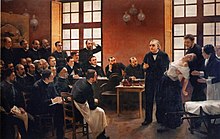
Back اضطراب التحويل Arabic Trastorn de conversió Catalan Konversionsstörung German Διαταραχή μετατροπής Greek Trastorno de conversión Spanish اختلال تبدیلی Persian Konversiohäiriö Finnish Trouble de conversion French הפרעת המרה HE Konverzivni poremećaj Croatian
| Conversion disorder | |
|---|---|
 | |
| Jean-Martin Charcot demonstrating hypnosis in a hysterical patient to his students. Hysteria as a clinical diagnosis was later replaced by conversion disorder. | |
| Specialty | Psychiatry, Neurology |
| Symptoms | Numbness, weakness, paralysis, seizures, tremor, fainting, impaired hearing, swallowing and vision |
| Causes | Long term stress |
| Treatment | Cognitive behavioral therapy, antidepressants, physical/occupational therapy |
Conversion disorder (CD), or functional neurologic symptom disorder, is a diagnostic category used in some psychiatric classification systems. It is sometimes applied to patients who present with neurological symptoms, such as numbness, blindness, paralysis, or fits, which are not consistent with a well-established organic cause, which cause significant distress, and can be traced back to a psychological trigger. It is thought that these symptoms arise in response to stressful situations affecting a patient's mental health or an ongoing mental health condition such as depression. Conversion disorder was retained in DSM-5, but given the subtitle functional neurological symptom disorder. The new criteria cover the same range of symptoms, but remove the requirements for a psychological stressor to be present and for feigning to be disproved. The ICD-10 classifies conversion disorder as a dissociative disorder,[1] and the ICD-11 as a dissociative disorder with unspecified neurological symptoms.[2][3] However, the DSM-IV classifies conversion disorder as a somatoform disorder.[4]
- ^ International Statistical Classification of Diseases and Related Health Problems, 10th Revision. F44.9
- ^ World Health Organization (2023). "6B60 Dissociative neurological with unspecified symptoms ". International Classification of Diseases, eleventh revision – ICD-11. Genova – icd.who.int.
- ^ World Health Organization (2023). "6B60.Z Dissociative neurological symptom disorder, with unspecified symptoms ". International Classification of Diseases, eleventh revision – ICD-11. Genova – icd.who.int.
- ^ Diagnostic and statistical manual of mental disorders: DSM-IV ; includes ICD-9-CM codes effective 1. Oct. 96 (4 ed.). American Psychiatric Association. 1994.
© MMXXIII Rich X Search. We shall prevail. All rights reserved. Rich X Search